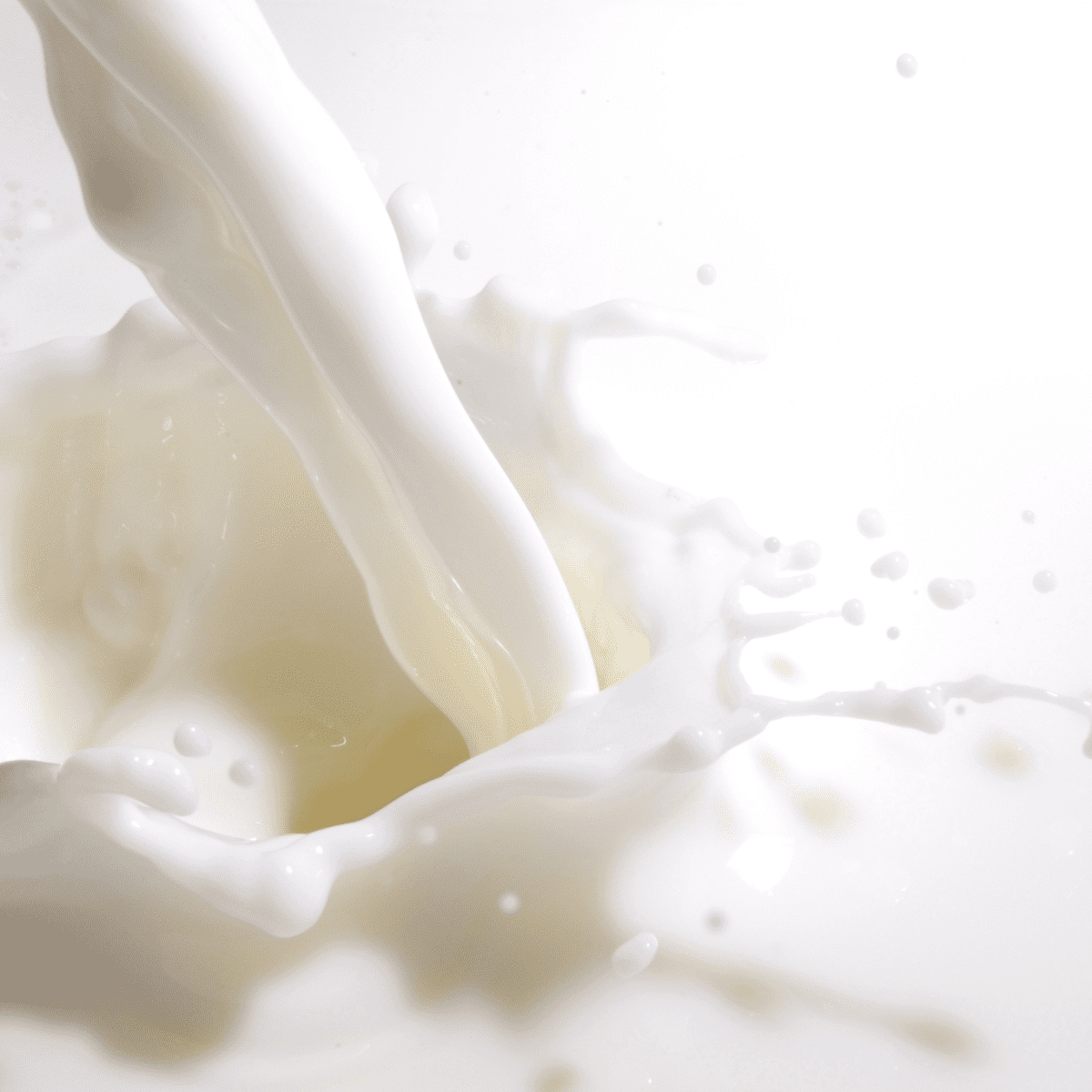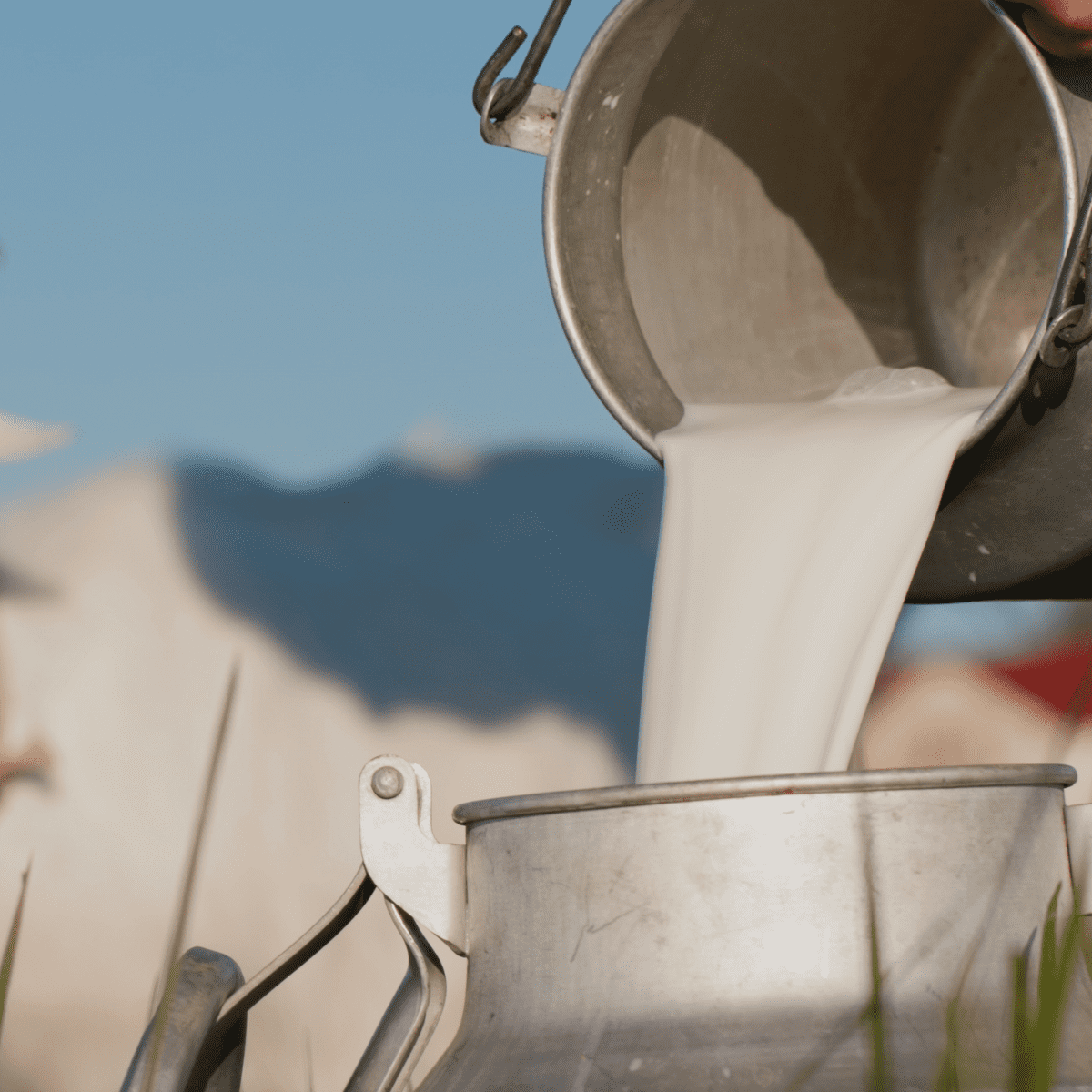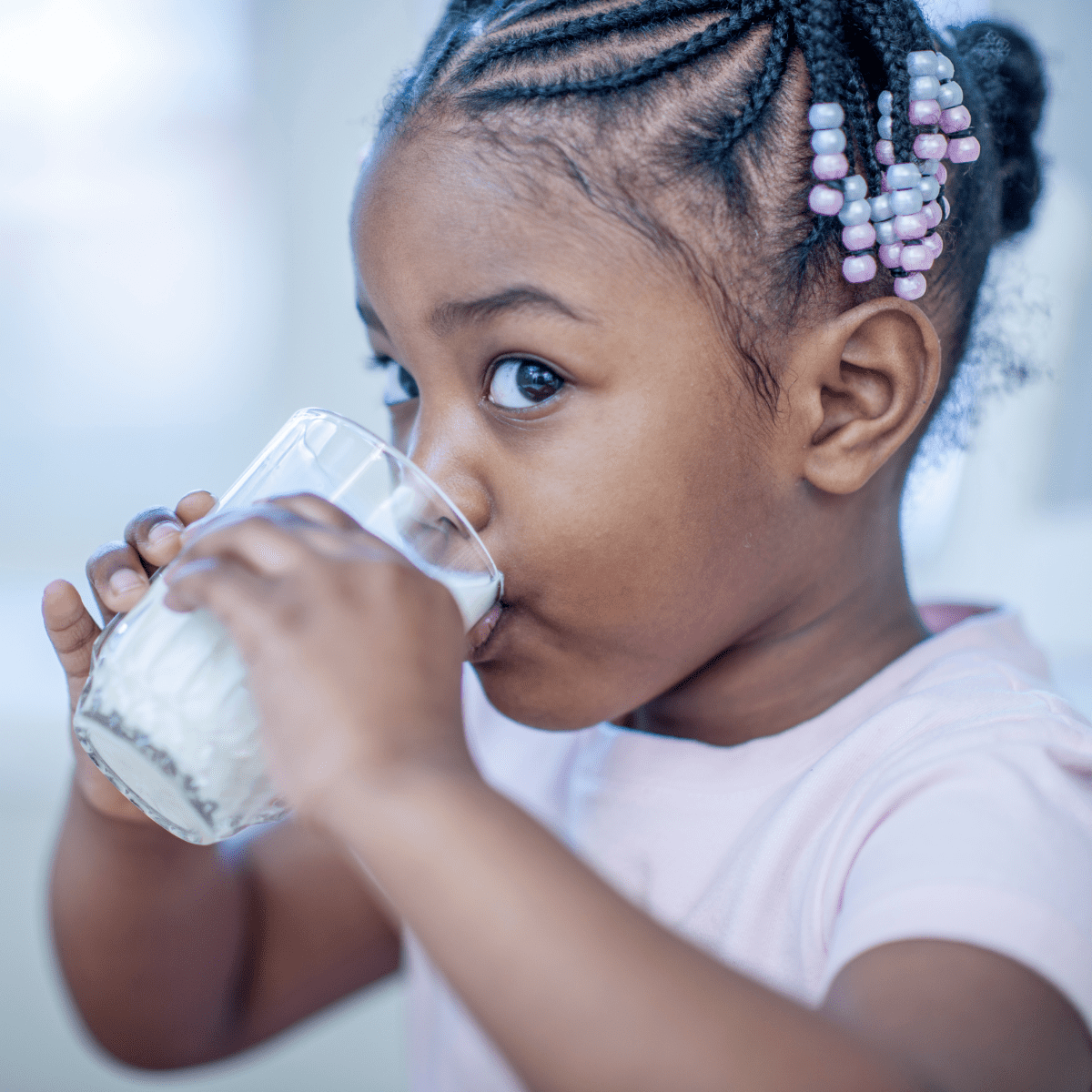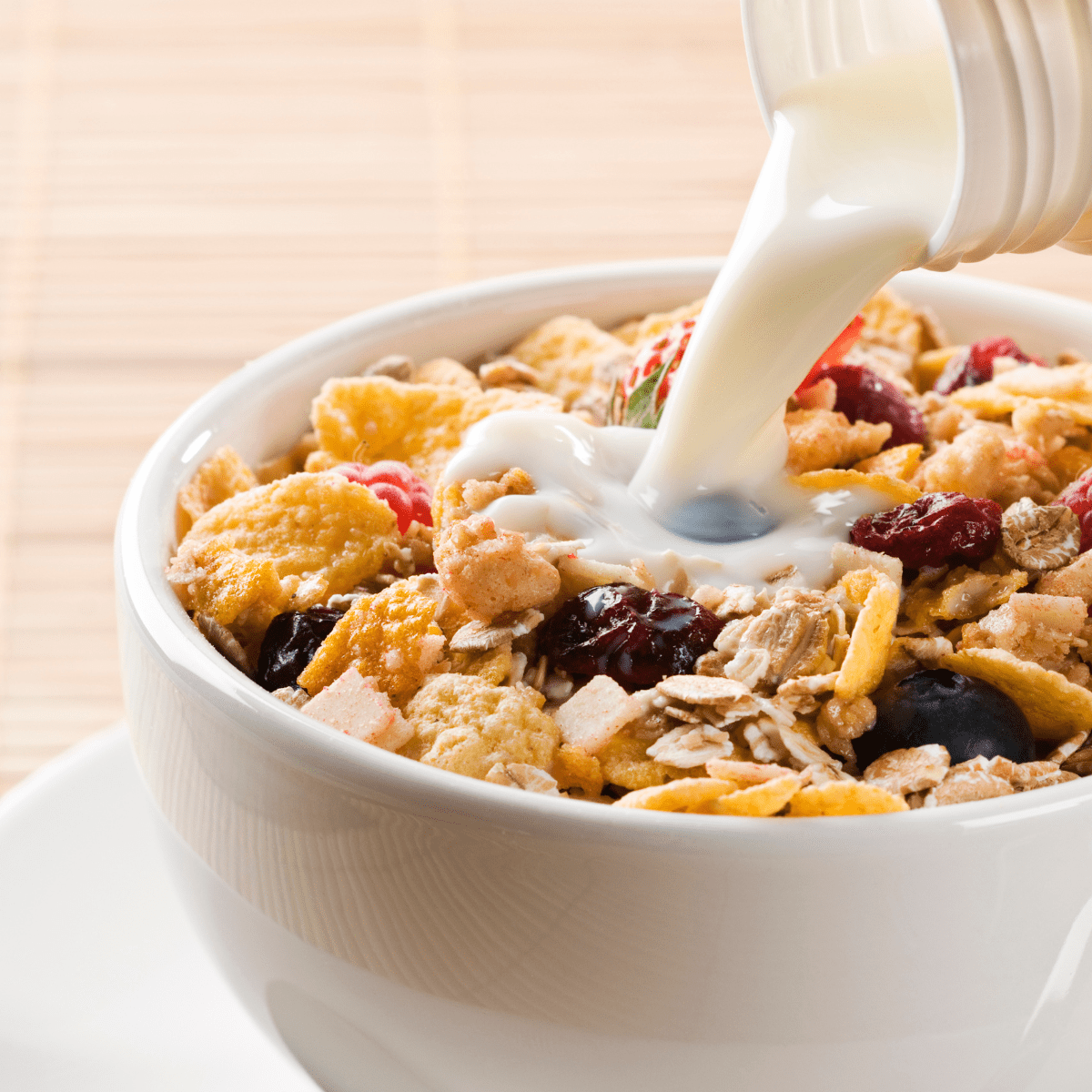Are Raw Milk And Goat Milk Safe For Toddlers To Drink?
Feb 01, 2023, Updated Feb 08, 2024
This post contains affiliate links. Please see our disclosure policy.

Milk is always a hot-button issue. There’s cow’s milk, goat milk, and every plant-based milk alternative under the sun. There are questions about milk’s health properties and nutrition. There are questions about the impacts milk has on the planet. There are questions about access and availability. It’s a lot to think about! So it makes sense that you might be wondering what the best milk choice for your toddler might be.
Often, with milk, the decision is not strictly based on health. Nutrition matters, of course! But you might also be deciding based on your views on animal byproducts and the impacts that different types of milk have on the planet. And I get that! But there are two types of milk where, as a pediatric dietitian, I think the nutritional breakdown and safety of serving them to a toddler should be front and center: goat milk and raw milk. There are some big (and often unsubstantiated) claims about the health benefits of these milks. And, depending on how they’re made, there can be questions about safety when serving them to toddlers.
So while all the reasons to be choosy about milk are important, today, I’m going to speak to the health and safety benefits and concerns around serving goat milk and raw milk to toddlers. We’ll look at the facts, help you understand what’s safe and what’s not, and make sure that at the end of the day, your toddler is getting the best milk for their growing body.
Table of Contents
- All About Raw Milk (AKA Unpasteurized Milk)
- The Risks, Benefits & Misconceptions About Raw Milk
- Is Unpasteurized Milk Safe for Toddlers?
- All About Goat Milk
- Goat Milk & Milk Allergies
- Goat Milk, Lactose Intolerance & Digestion
- So, Is Goat Milk Safe for Toddlers?
- Daily Milk & Dairy Requirements for Toddlers
- More On Milk for Toddlers
- Free Healthy Cereal Guide
All About Raw Milk (AKA Unpasteurized Milk)
First, when I say saw “raw milk”, it’s important for you to know that I’m talking about unpasteurized cow’s milk.
Pasteurization is a heat treatment used to make raw food products, like fresh juice and milk, safe for human consumption. It’s a regulated process where the milk is heated to set, high temperatures for a specific amount of time and as a result, harmful bacteria get killed. This reduces the risk that milk will contain disease-causing organisms or cause foodborne illnesses. Pasteurization doesn’t significantly change the nutritional breakdown of milk, it just makes the milk safer to drink. So pasteurization is a really good thing!
Okay, so pasteurized milk is safe. But does that mean unpasteurized milk is unsafe? Let’s get into it.
The Risks, Benefits & Misconceptions About Raw Milk

According to a comprehensive report by the Food and Drug Administration (FDA), overall, there are no benefits to raw milk consumption, especially compared to the risks. Pasteurization kills potentially dangerous bacteria and greatly reduces the risk of illness, so pasteurized milk is recommended over raw.
The FDA’s report also busts many popular misconceptions about raw milk, stating that:
- Raw milk does not cure lactose intolerance.
- Raw milk does not cure or treat asthma and allergy.
- Raw milk is not more effective in preventing osteoporosis than pasteurized milk.
- There are no beneficial bacteria in raw milk for gastrointestinal health.
- Raw milk is not an immune system-building food and is particularly unsafe for children.
- There are no immunoglobulins in raw milk that enhance the human immune system.
- Raw milk is not nutritionally superior to pasteurized milk.
- Raw milk does not contain natural antimicrobial components that make it safe.
It includes lots of other evidence-backed information, too. If you’re interested in reading individual studies and accessing specific data, check out the full report.
Is Unpasteurized Milk Safe for Toddlers?

No, unpasteurized milk is not safe for toddlers or young children. Unpasteurized products can be contaminated with E. coli, salmonella, listeria, and other disease-causing organisms. And while it’s not guaranteed that raw milk will contain these things, the risk isn’t worth it. Consuming raw milk can lead to foodborne illness, and I don’t want your little one to get sick!
Even if you are comfortable drinking raw milk or have been drinking it for years, remember that your toddler’s gut and immune system are less mature than yours. So they’re more likely to be affected by the presence of bad bacteria in a batch of raw milk than you are. So again, raw milk just isn’t the best choice for your growing toddler.
Can You Give Raw Milk To Toddlers?
While I do not recommend giving raw milk to your toddler, they are your toddler. And nutritionally speaking, raw and pasteurized milk are very similar. So if you have a small, local farm or a trusted raw milk supplier that you feel comfortable getting raw milk from, you might choose to serve it anyway. But I recommend doing a risk-benefit assessment for the perks of raw milk versus the potential for illness. Then, decide what you’re comfortable with given what we know about the safety risks of raw milk.
All About Goat Milk

Goat milk is often seen as an alternative to cow’s milk and for good reason! Nutritionally, goat’s milk and cow’s milk (whole milk, specifically) are almost identical in terms of protein and fat content, overall calories, and the vitamins and minerals they contain.
Because it’s so similar to cow’s milk, it’s not a good option if your family deals with lactose intolerance. And it won’t help if your child has a cow’s milk protein allergy (more on this below). But if you’re looking for an alternative simply because you don’t like to serve cow’s milk, goat milk could be a great option!
Goat Milk & Milk Allergies
It’s important to know that goat milk is not less allergenic than cow’s milk. Goat milk proteins have a similar structure to cow’s milk proteins, so if your child has a cow’s milk protein allergy (CMPA), it’s likely that they’ll also be allergic to goat milk.
Goat Milk, Lactose Intolerance & Digestion
Many people believe that goat milk is okay for kids who are lactose intolerant, but it’s not actually true. Goat milk contains less lactose than cow’s milk, but it still does contain lactose. So if your child is lactose intolerant, goat milk isn’t the solution.
That said, goat milk does have some properties that make it easier to digest! So it can be good for kids who have sensitive stomachs and struggle to digest cow’s milk for other reasons.
So, Is Goat Milk Safe for Toddlers?
Yes! As long as it’s not raw, goat’s milk is perfectly safe for your toddler to drink. Potential cons of goat’s milk are that it’s not a solution to issues like lactose intolerance or a cow’s milk protein allergy, it tastes different than cow’s milk, and it’s often more expensive, too. And, it may or may not be available at your local grocery store. But nutritionally speaking, it’s a great choice. So whether or not you serve goat milk to your toddler is more a question of preference than safety.
Daily Milk & Dairy Requirements for Toddlers

Whether it’s cow’s milk, goat’s milk, or a fortified plant-based milk alternative, I recommend no more than 16-20 oz (around 2 to 2.5 cups per day) of milk for toddlers. And no more than 3-4 servings of dairy a day.
One serving of dairy for a toddler looks like:
- ½ cup milk
- ⅓ cup yogurt
- ½ oz cheese (a cheese stick is 1 oz)
If your toddler is consuming more milk or dairy products than that, chances are they’ll be filling up a bit too much on it. That could mean they won’t get the nutrients they would have gotten from other foods had they been hungry enough to eat them. Things like fruit, veggies, and whole grains!
What About Protein for Toddlers?
Culturally, we’re told that protein is super important and it’s often implied that there’s no such thing as too much, but that’s not actually true. Especially for toddlers!
Kids don’t need a TON of protein. So 3-4 servings of dairy products—or fortified, non-dairy options—will do a good job of helping them meet their protein needs. If they’re having much more than this amount of dairy each day, they might end up having more than they need, which isn’t the best thing for them.
Too much dairy protein might also crowd out other protein sources in their diet that could contribute iron, an important nutrient.
Related: Protein for Kids & Toddlers
More On Milk for Toddlers
If you’ve got questions about milk for toddlers in general, things like
- Do toddlers need milk?
- Non-dairy milk for toddlers: Yes or No?
- What’s the best kind of milk for toddlers?
- When should toddlers & kids drink milk?
- What’s the deal with hormones in milk?
- Does organic matter?
Read my post all about milk for toddlers!
Other Milk Resources
- What to Do if Your Toddler isn’t Drinking Cow’s Milk
- Soy Milk for Toddlers: Is it Bad?
- Almond Milk: Should My Toddler Drink It?
- The Best Almond Milk for Babies
Free Healthy Cereal Guide

Because what goes better with milk?!
Cereal can be healthy. And my ultimate guide to low-sugar options makes finding the good ones really easy! Get an easy-to-shop list of my favorite brands, then pair one with your toddler’s milk of choice and a little fruit for a balanced breakfast everyone feels good about.













If you want people to take your articles seriously, d9 better research. Using the FDA as a source is just making us laugh. This article is rubbish.
I would like to know the number of people who have obtained an illness from pasteurized milk vs unpasteurized milk. I understand that majority of people who drink milk are not drinking raw milk, but I think if you claim that is actually harmful for toddlers to drink raw milk, then you need to back it up with facts. The facts I’m looking for are not a study done by the FDA, I want to know actual cases. Feel free to email me the number of people or children who have gotten seriously or fatally ill from raw milk vs pasteurized milk. Thank you
100% this article is crap. Looks like she Googled “why is raw milk bad” and just wrote it. Lol